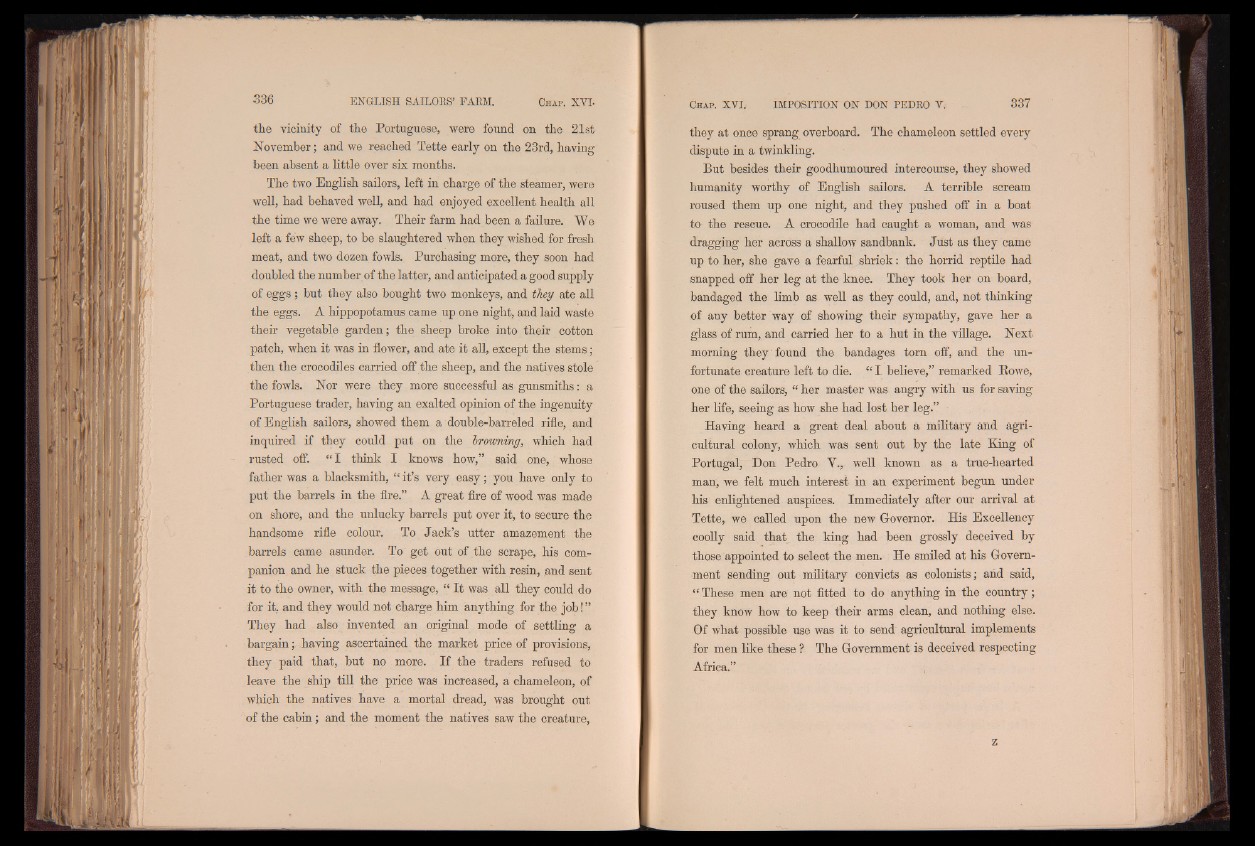
the vicinity of the Portuguese, were found on the 21st
November; and we reached Tette early on the 23rd, having
been absent a little over six months.
The two English sailors, left in charge of the steamer, were
well, had behaved well, and had enjoyed excellent health all
the time we were away. Their farm had been a failure. We
left a few sheep, to be slaughtered when they wished for fresh
meat, and two dozen fowls. Purchasing more, they soon had
doubled the number of the latter, and anticipated a good supply
of eggs; but they also bought two monkeys, and they ate all
the eggs. A hippopotamus came up one night, and laid waste
their vegetable garden; the sheep broke into their cotton
patch, when it was in flower, and ate it all, except the stems;
then the crocodiles carried off the sheep, and the natives stole
the fowls. Nor were they more successful as gunsmiths: a
Portuguese trader, having an exalted opinion of the ingenuity
of English sailors, showed them a double-barreled rifle, and
inquired if they could put on the broimving, which had
rusted off. “ I think I knows how,” said one, whose
father was a blacksmith, “ it’s very easy; you have only to
put the barrels in the fire.” A great fire of wood was made
on shore, and the unlucky barrels put over it, to secure the
handsome rifle colour. To Jack’s utter amazement the
barrels came asunder. To get out of the scrape, his companion
and he stuck the pieces together with resin, and sent
it to the owner, with the message, “ I t was all they could do
for it, and they would not charge him anything for the job! ”
They had also invented an original mode of settling a
bargain; having ascertained the market price of provisions,
they paid that, but no more. If the traders refused to
leave the ship till the price was increased, a chameleon, of
which the natives have a mortal dread, was brought out
of the cabin; and the moment the natives saw the creature,
they at once sprang overboard. The chameleon settled every
dispute in a twinkling.
But besides their goodhumoured intercourse, they showed
humanity worthy of English sailors. A terrible scream
roused them up one night, and they pushed off in a boat
to the rescue. A crocodile had caught a woman, and was
dragging her across a shallow sandbank. Just as they came
up to her, she gave a fearful shriek: the horrid reptile had
snapped off her leg at the knee. They took her on board,
bandaged the limb as well as they could, and, not thinking
of any better way of showing their sympathy, gave her a
glass of rum, and carried her to a hut in the village. Next
morning they' found the bandages torn off, and the unfortunate
creature left to die. “ I believe,” remarked Rowe,
one of the sailors, I her master was angry with us for saving
her life, seeing as how she had lost her leg.”
Having heard a great deal about a military and agricultural
colony, which was sent out by the late King of
Portugal, Don Pedro Y., well known as a true-hearted
man, we felt much interest in an experiment begun under
his enlightened auspices. Immediately after our arrival at
Tette, we called upon the new Governor. His Excellency
coolly said that the king had been grossly deceived by
those appointed to select the men. He smiled at his Government
sending out military convicts as colonists; and said,
“ These men are not fitted to do anything in the country;
they know how to keep their arms clean, and nothing else.
Of what possible use was it to send agricultural implements
for men like these ? The Government is deceived respecting
Africa.”
z